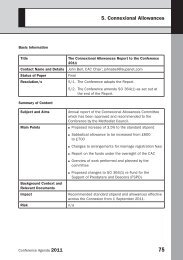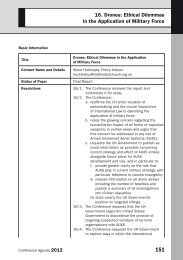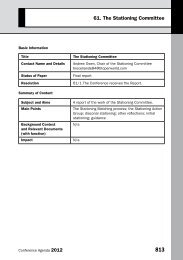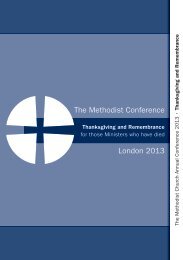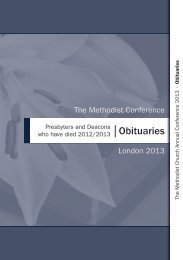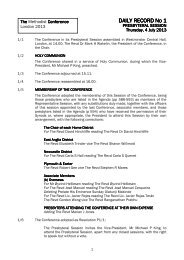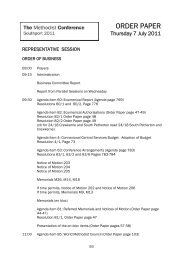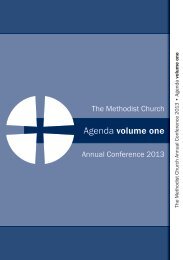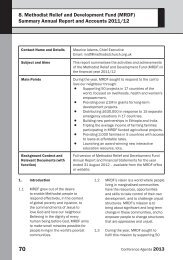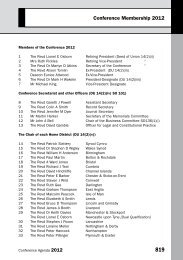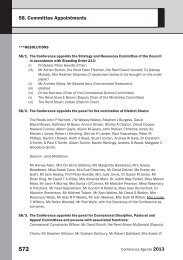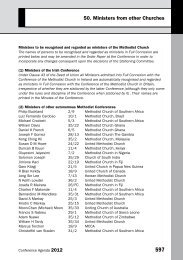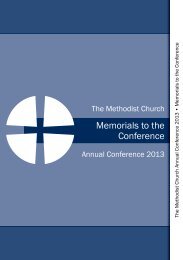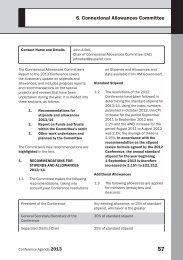Agenda Volume 3 - Methodist Conference
Agenda Volume 3 - Methodist Conference
Agenda Volume 3 - Methodist Conference
Create successful ePaper yourself
Turn your PDF publications into a flip-book with our unique Google optimized e-Paper software.
57. The Fruitful Field Project<br />
a significant change of culture, the<br />
Church will be required to engage<br />
with the HE sector in a manner<br />
which moves away from established<br />
assumptions.<br />
Ecumenical and international partnerships<br />
93 Resources in the field of formation,<br />
learning and development are<br />
often shared with those of other<br />
denominations and traditions. Several<br />
learning institutions, for example, are<br />
deeply embedded in partnerships<br />
with other institutions affiliated with<br />
the Anglican, Reformed, Baptist,<br />
Roman Catholic and Orthodox<br />
traditions.<br />
94 Regional Training Partnerships<br />
(RTPs) – which often include learning<br />
resources from the <strong>Methodist</strong> Church,<br />
the Church of England and the United<br />
Reformed Church – were seen by<br />
many as offering the possibility of<br />
coherent, systematic ecumenical<br />
collaboration across regions in<br />
England. However, it is by now clear<br />
that RTPs have delivered only patchy<br />
and sporadic successes, and are<br />
sometimes seen as demanding a<br />
disproportionate amount of energy<br />
for minimal results. Ecumenical<br />
partnerships in Scotland and Wales<br />
have often found more effective ways<br />
of releasing energy and resources for<br />
shared learning and development.<br />
95 The success of the Mission Shaped<br />
Intro and Mission Shaped Ministry<br />
courses, developed by the Fresh<br />
Expressions agency, offers an<br />
example of energising pathways<br />
which can emerge from ecumenical<br />
partnerships.<br />
96 Any assessment of connexional<br />
learning commitments must take<br />
seriously the opportunities offered<br />
by ecumenical partnerships, and<br />
an alignment of visions across<br />
denominational boundaries will<br />
be crucial for future growth and<br />
development. It is also important to<br />
note the opportunities offered by a<br />
wider ecumenical agenda. Many of<br />
our learning institutions are already<br />
reaching out to new ecumenical<br />
partners in the Black Majority<br />
Churches, para-church organisations,<br />
large non-aligned churches, and<br />
smaller denominations in the<br />
holiness tradition.<br />
97 Similarly, it is important to act on<br />
the opportunity for more structured<br />
partnerships with the learning<br />
activities of overseas Partner<br />
Churches. Over recent months,<br />
several of our institutions have<br />
sought to implement exchange<br />
programmes with seminaries which<br />
serve the United <strong>Methodist</strong> Church,<br />
with positive results. During the<br />
same period the <strong>Methodist</strong> Church<br />
in Britain has been approached by<br />
learning institutions which serve<br />
other Partner Churches seeking<br />
national partnerships and structured<br />
collaboration. There are rich<br />
opportunities here for the <strong>Methodist</strong><br />
Church to be able to respond to the<br />
desire of our partners for a richer<br />
and more accessible British base – a<br />
<strong>Conference</strong> <strong>Agenda</strong> 2012 675



